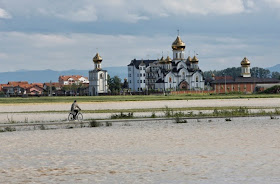Dec. 14, 2014. On behalf of a wealthy donor, police officers in Kansas City, Missouri, gave away money to unsuspecting drivers. Steve Hartman reports. (CBS News )
Watch the video and answer the questions. Alternatively you can watch the video here . (Click the CC button at the bottom of the video to turn on the captions but keep in mind they might contain a few errors.)
Comprehension Questions
- Who is "Secret Santa"?
- What does he do every year?
- What has he changed this year?
- What sort of people did the officers choose?
- What were the people's reactions?
- How did Jessica Rodriguez' initial attitude change through her encounter with the deputy?
- What was the main objective of this operation?
- What else did "Secret Santa" want to achieve this year?
Vocabulary
- A sting (operation) is a clever secret plan by the police to catch criminals.
- A deputy is a police officer in some parts of the US who does the sheriff's job when the sheriff is away.
- When you deputize someone, you give them the power to do something in place of another person. e.g. The new system deputizes the nurses to perform some of the doctors' duties.
- "Benjamins" is a common word for the United States one hundred-dollar bills ($100), which have Benjamin Franklin's portrait on one side.
- Bondo is a trademark for a variety of materials used to repair automobile bodies.
- If something blows you away, it impresses you a lot and makes you very happy. e.g. I was really blown away by her latest movie.
- If you are caught off guard, you are surprised by something unexpected. e.g. He was caught completely off guard by her questions.
- Law enforcement is the job of making sure that people obey the law.
- The law-abiders are the people who abide by (=obey) the law.
- If you are assaulted, you are attacked violently. e.g. An elderly woman was assaulted and robbed.
- You surrender when you admit that you have been defeated and you allow yourself to be caught, taken prisoner, etc. The enemy finally surrendered after three days of fighting.
Now watch the video again and try the following quiz.
To view the video transcript click here .












